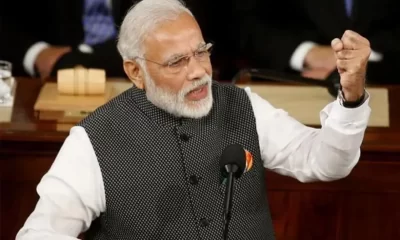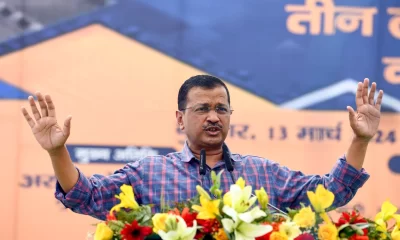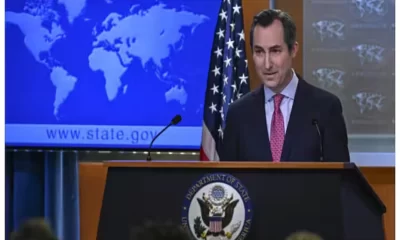Latest world news
India getting unhappier, Pakistan happier: UN’s World Happiness Index
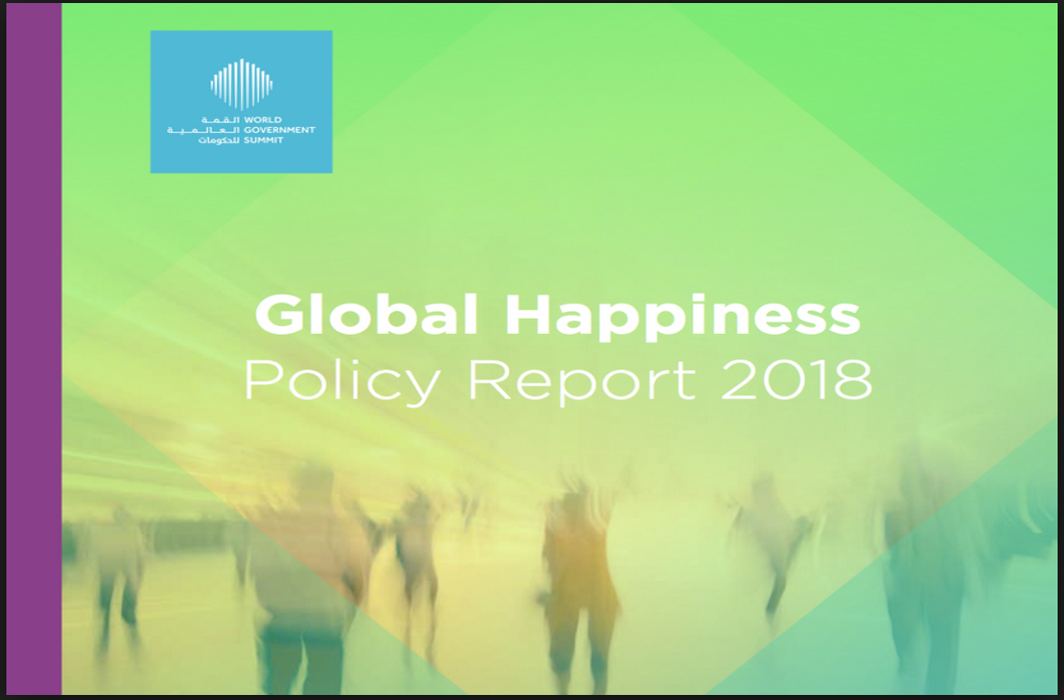
India has steadily slipped in ranking on United Nation’s World Happiness Index.
India ranked 122nd in 2017, and 118th in 2016, meaning it dropped four places in the 2017 World Happiness Report and fell a further 11 places in the 2018 report to rank a low 133 on the list of 156 countries monitored by the United Nations’ Sustainable Development Solutions Network for its annual ‘joy’ report.
While Indians are apparently getting unhappier by the year, their not-so-well-off neighbours in Pakistan are becoming more joyful, according to the UN ranking.
By comparison, terror-ravaged Pakistan, which was already ‘happier’ than India in the 2017 rankings, is shown as being even happier in the 2018 rankings. It’s on number 75, up five spots from last year.
And it is not just Pakistan. India was behind all its neighbours and the majority of South Asian Association for Regional Cooperation (SAARC) nations, apart from war-ravaged Afghanistan, that stood at 145.
Among the eight SAARC nations, Pakistan was at 75 (as mentioned above), Bhutan at 97, Nepal at 101, Bangladesh at 115 while Sri Lanka was ranked 116. Maldives did not figure in the World Happiness Report.
Even state-controlled China is happier than India.
The World Happiness Report released on Wednesday, March 14 – ahead of the International Day of Happiness on March 20 – put Finland at the top among 156 countries ranked by happiness levels, based on factors such as life expectancy, social support and corruption.
Finland has risen from fifth place last year to oust Norway from the top spot. In fact, Nordic countries have consistently dominated the top 10. This year the top ten are: Finland, Norway, Denmark, Iceland, Switzerland, Netherlands, Canada, New Zealand, Sweden and Australia.
Taking the harsh, dark winters in their stride, Finns said access to nature, safety, childcare, good schools and free healthcare were among the best things about in their country, said media reports quoting people living in Finland.
Sub-Saharan African nations continued to be the least happy in the world. The bottom five included Burundi, Central African Republic, South Sudan, Tanzania, and West Asia’s Yemen. These countries ranked high on ‘dystopia’ as per the UN.
UN Sustainable Development Solutions Network’s (SDSN) report is based on factors like per capita GDP, social support systems, life expectancy, social freedom, corruption levels and general health.
India underperformed in ‘freedom to make life choices’ and ‘generosity’, according to the index. The 2018 WHR observed Indians were increasingly migrating to other countries. “There were big flows from the Indian sub-continent to the Gulf States,” it stated.
Last year also witnessed the increasing mixing of Indians and Europeans in Latin America. According to WHR, “many male and female Indians enjoy high social status” in these regions.
The United States came in at 18th, down from 14th place last year. Britain was 19th and the United Arab Emirates 20th.
Serious academics have long been calling for more testing about people’s emotional well-being, especially in the United States. In 2013, the National Academy of Sciences issued a report recommending that federal statistics and surveys, which normally deal with income, spending, health and housing, include a few extra questions on happiness because it would lead to better policy that affects people’s lives.
One chapter of the 170-page report is dedicated to emerging health problems such as obesity, depression and the opioid crisis, particularly in the United States where the prevalence of all three has grown faster than in most other countries. While its per capita income is on the rise, happiness has been dented by weakening social support, and a perception of increasing government corruption.
For the first time since it was started in 2012, the report, which uses a variety of polling organizations, official figures and research methods, ranked the happiness of foreign-born immigrants in 117 countries. Finland took top honours in that category too, giving the country a statistical double-gold status.
The foreign-born were least happy in Syria, which has been mired in civil war for seven years. “The most striking finding of the report is the remarkable consistency between the happiness of immigrants and the locally born,” said Professor John Helliwell of Canada’s University of British Columbia.
“Although immigrants come from countries with very different levels of happiness, their reported life evaluations converge towards those of other residents in their new countries,” he said. “Those who move to happier countries gain, while those who move to less happy countries lose.”
The United States was 11th in the first index and has never been in the Top 10. To explain its fall to 18th, the report’s authors cited several factors.
While U.S. income per capita has increased markedly over the last half century, happiness has been hit by weakened social support networks, a perceived rise in corruption in government and business and declining confidence in public institutions.
“The U.S. is in the midst of a complex and worsening public health crisis, involving epidemics of obesity, opioid addiction, and major depressive disorder that are all remarkable by global standards,” the report said.
It added that the “sociopolitical system” in the United States produces more income inequality – a major contributing factor to unhappiness – than other countries with comparatively high incomes.
“We obviously have a social crisis in the United States: more inequality, less trust, less confidence in government,” the head of the SDSN, Professor Jeffrey Sachs of New York’s Columbia University, told Reuters as the report was launched at the Vatican’s Pontifical Academy of Sciences.
“It’s pretty stark right now. The signs are not good for the U.S. It is getting richer and richer but not getting happier.”
Asked how the current political situation in the United States could affect future happiness reports, Sachs said:
“Time will tell, but I would say that in general that when confidence in government is low, when perceptions of corruption are high, inequality is high and health conditions are worsening … that is not conducive to good feelings.”
There are lessons for India there.
Latest world news
World Earth Day 2024: Google Doodle showcases aerial view of planet’s natural beauty
Google celebrated Earth Day 2024 with a special doodle featuring an aerial view of our planet’s biodiversity.

Google shared a doodle today to celebrate World Earth Day 2024, which showcased aerial photos of the planet’s biodiversity and natural beauty. Google reminded us of the importance of protecting planet earth for future generations with the help of this doodle.
The Google letters depict specific locations across the globe where people, communities, and governments work every day to help protect the planet’s natural beauty, biodiversity, and resources, according to the explanation of the annual Earth Day 2024 doodle on their website.
It said, these examples remind us that there’s much more to do to address the climate crisis and biodiversity loss, but also offer the promise of hope and optimism.
The islands of Turks and Caicos are represented by the letter “G.” The islands’ conservation efforts are concentrated on protecting important regions for biodiversity and addressing persistent environmental problems.
The largest reef in the southern Gulf of Mexico and a UNESCO biosphere reserve, Scorpion Reef National Park, is represented by the letter “O” in the Mexican flag.
The letter “O” features Iceland’s Vatnajokull National Park, which was designated as a national park in 2008 following decades of advocacy. The ecology within and surrounding the biggest glacier in Europe is safeguarded by this UNESCO World Heritage Site.
The letter “G” has the Jau National Park in Brazil on it. It is a UNESCO World Heritage Site and one of the biggest forest reserves in South America.
The Great Green Wall of Nigeria is represented by the letter “L,” and the Pilbara Islands Nature Reserves of Australia are represented by the letter “E.”
Meanwhile, Earth Day is a worldwide event that promotes protection of the environment every year. April 22 serves as a reminder of the importance of conservation efforts and sustainable practices to guarantee a healthier world and a brighter future.
The occasion inspires people across the world to come together and take action to protect the environment, strengthening our bonds with nature and promoting good change.
Latest world news
Bigg Boss 14 contestant Rahul Vaidya struggles walking in knee deep water, compares Dubai rains with Mumbai floods
Singer and TV personality Rahul Vaidya was recently stranded in the Dubai rains.

Rahul Vaidya, who was in Dubai ahead of his show which was scheduled to take place today, left the country due to heavy rains and reached Kolkata. The artist shared on social media his encounters in the UAE city, including challenges like walking through knee-deep water. Rahul provided an update regarding the heavy rainfall in Dubai on his Instagram profile.
The Bigg Boss 14 contestant revealed that he was in Kolkata and prepared to do an evening performance. Recalling the terrifying period he went through, Vaidya said there was a lot of confusion and panic in Dubai. The situation was similar to that when heavy floods hit Mumbai in 2005.
Vaiday also posted seval other images and videos of cars that were underwater and flooded roadways. The Bigg Boss 14 contestant, who shared his ordeal, claimed that even though it had just rained for two hours, the situation was dire.
In one of the video, which went viral he can be seen struggling in walking in knee-deep water. He can be also seen holding his sneakers in one hand and with other hand he was seen managing other things.
This is the result of the two hours of rain that it had, he can be heard saying in the video. Vidya also said he dosen’t believe Dubai is accustomed to a lot of rain. Everything had stopped working, he remarked.
After taking part in the first season of the singing reality show Indian Idol, Rahul Vaidya gained widespread recognition. In addition to Bigg Boss, he took part in Khatron Ke Khiladi 11.
Meanwhile, heavy rains that triggered flooding in the UAE and Bahrain, which left 18 people dead in Oman on Sunday and Monday, have paralyzed the financial hub of the Middle East, Dubai.
A lot of incoming flights were diverted from Dubai’s international airport because of the rain. At 7:26 p.m., the busiest airport in the world for foreign visitors stopped accepting new arrivals; a gradual resumption was announced for more than two hours later.
Images of planes navigating flooded tarmacs are making the rounds on social media.
According to pictures shared on social media, the flagship malls Dubai Mall and Mall of the Emirates both experienced heavy floods, while at least one Dubai Metro station had water up to the ankles.
There were several road collapses, severe flooding in residential areas, and numerous reports of leaks from windows, doors, and roofs.
Due to the unfavourable weather, schools around the United Arab Emirates were forced to close, and as more storms are predicted, the closures are anticipated to last until Wednesday. The government of Dubai allowed its staff to work remotely till this Wednesday.
Latest world news
Dubai sky turns green during storm in UAE, video goes viral
The UAE witnessed record-breaking rainfall on Tuesday and the National Centre of Meteorology recorded 254 mm of rainfall in less than 24 hrs in the Khatm Al Shakla area in Al Ain.

1 person was killed in UAE as it witnessed heavy rainfall on Tuesday, stranding commuters, flooding roads, disrupting trains and flights and resulting in water leakage from mall ceilings. The UAE witnessed record-breaking rainfall on Tuesday and the National Centre of Meteorology recorded 254 mm of rainfall in less than 24 hrs in the Khatm Al Shakla area in Al Ain. It is being said that the rainfall was the highest documented since the start of data collection in 1949.
The heavy rainfall in UAE came days after a similar situation in neighbouring Oman, where 13 people were killed in flash floods. Many parts of Oman saw torrential rains, which caused students to be trapped in buses and swept away motorists and trapped people in their homes.
Videos from Dubai circulating on social media showed widespread waterlogging on roads in Abu Dhabi, Dubai and other important cities. This left daily commuters in cars and other vehicles struggling to get back home. Dubai metro station too was seen flooded and closed.
One such video circulating on social media shows the aerial view of the city of Dubai from the top of a building. In the video the stormy winds are seen blowing over the city of Dubai. As the storm intensifies the Dubai sky turns green and ultimately gets covered by heavy rainfall. The video has gone viral on social media with more than 1.1 million views.
Another video showed water leakage from the ceilings of shopping malls, flooding the floors and destroying goods. A video which was shot in the famous Mall of the Emirates, showed pieces of ceiling falling as the rainwater gushed inside. Videos from many outlets of the Deira City Centre mall chain showed escalators being rendered unusable. Majid Al Futtaim, the company which owns the Mall of Emirates, said that the shopping complexes have been kept open and the customers are being sent away from the flooded areas.
-

 Cricket news18 hours ago
Cricket news18 hours agoIPL 2024: Yashasvi Jaiswal hits brilliant century to help Rajasthan Royals beat Mumbai Indians by 9 wickets
-
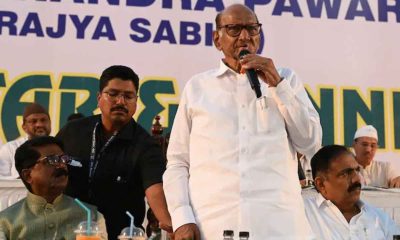
 2024 Lok Sabha Elections17 hours ago
2024 Lok Sabha Elections17 hours agoNCP (SP) leader Sharad Pawar says Prime Minister Narendra Modi is trying to create fear like Russian President Vladimir Putin
-

 Entertainment16 hours ago
Entertainment16 hours agoMithun Chakraborty, Usha Uthup honoured with Padma Bhushan
-

 Entertainment14 hours ago
Entertainment14 hours agoFan jumps on stage and hugs Atif Aslam during concert, video goes viral
-
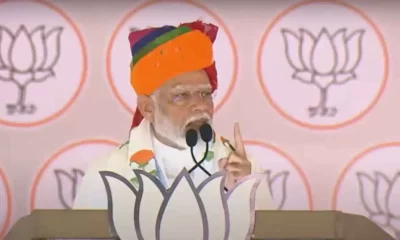
 2024 Lok Sabha Elections16 hours ago
2024 Lok Sabha Elections16 hours agoPrime Minister Narendra Modi says listening to Hanuman Chalisa under Congress rule is a crime
-

 Entertainment12 hours ago
Entertainment12 hours agoManisha Koirala reveals reason for rejecting Dil To Pagal Hai, says regrets that decision
-
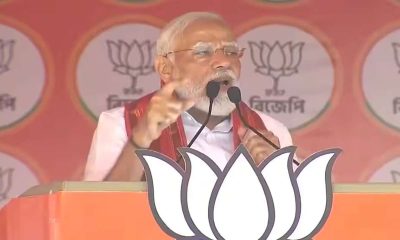
 2024 Lok Sabha Elections10 hours ago
2024 Lok Sabha Elections10 hours agoPM Modi says Congress leaders consider themselves above Lord Ram
-
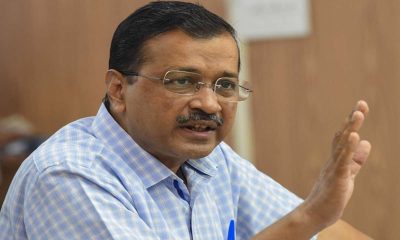
 India News18 hours ago
India News18 hours agoArvind Kejriwal given insulin in Tihar jail after sugar levels touch 320

